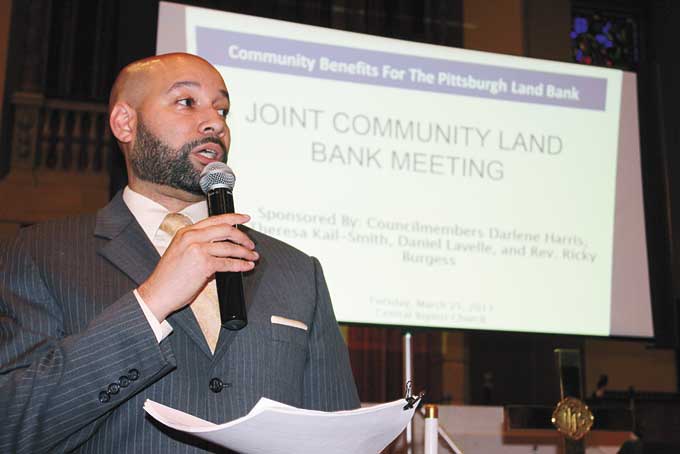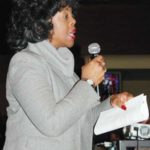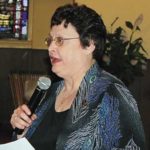
Less than a week after Hill District residents crowded a meeting on pending land bank legislation at Central Baptist Church shouting “kill the bill,” Mayor Bill Peduto met with city council proponents and representatives from several community development corporations, and told them to support this bill because it will pass.
Hill Consensus Group Convener Carl Redwood Jr. was among those who attended and said the mayor just counted heads.
“He has the votes. The thing is still changing, but it’s going to pass,” he said.
The March 25 forum at Central Baptist Church was ostensibly called to discuss possible amendments to the legislation introduced by councilwoman Deborah Gross in January as a way to dispose of blighted and tax-delinquent properties by turning them over to developers, nonprofits, and individuals in a more efficient and timely fashion.
But with 35 percent of the property in Lavelle’s district, which includes the Hill, eligible for the land bank, residents are clearly fearful of losing their homes, and came out in force to tell Pittsburgh city council members they object to proposed legislation, especially since the current bill allows the seizure of owner-occupied property.
“People are most definitely concerned. The original legislation didn’t have sufficient protections for owner-occupants, or renters,” said Hill Community Development Corporation President and CEO Marimba Milliones. “They are worried about not having any say in the process.”
Gross did not attend the March 25 meeting at Central Baptist Church, but Council members R. Daniel Lavelle, Rev. Ricky Burgess, Theresa Kail-Smith and Darlene Harris were present.
As a the result of a series of meetings with community groups and nonprofits—most of whom also attended the March 31 meeting with the mayor—Gross and Councilman Corey O’Connor have posted a series of amendments on the city website, including one that would require the city to set up hardship payment plans for owner occupants having difficulty paying their taxes.
Also, the section of the legislation allowing land bank staff, not its board, to dispose of properties valued at less than $50,000 would be eliminated. The full board would have to vote on all property transfers.
But the manner in which the land bank board is selected, and their number, are still bones of contention, as is the board’s autonomous ability to dispose of property without council oversight.
Burgess, who aired his concern over these issues to the New Pittsburgh Courier, even before Gross introduced her bill, said he will not cede council oversight when his district alone contains 24 percent of the bankable property in the city.
Gross and O’Connor have also posted amendments related to community participation, council oversight and maintenance of land bank property.
Instead of the original six board members—three chosen by the mayor and three by council, the amendment calls for adding three more who: “shall be residents of, or work at the community-based organization, in the three Council Districts with the greatest number of vacant and distressed properties; one member shall be designated from each of the three Council Districts.”
Another amendment would require: “locally sourcing its partnerships, joint ventures, contracts, etc. for maintenance, amendments add that preference shall be given to minority and women-owned business enterprises, and to organizations that provide workforce development opportunities for youth,” or “companies that provide prevailing wages to its employees.”
Burgess said the word “or” in both those amendments could be problematic. In the first case, people who lead or work for community groups, don’t always live in the community. Secondly, an out-of-town firm might pay a better wage than, say, a local Black-owned gardening company.
“The whole point is to get the land out of the hands of the people who live there and give it to an unelected unaccountable board,” said Burgess. “Without the land, there is no leverage. The community can object, they can say some words, but the board has the power.”
Still unaddressed is the issue of how, and by whom, the land bank would be funded. Possibilities include, foundation funding, tax revenue from the property it assumes, or direct funding by the city, which already pays for a real estate office and the Urban Redevelopment Authority.
Gross and O’Connor had planned to reintroduce the legislation April 2, but following the meeting with the mayor, have pushed it back a week.
(Send comments to cmorrow@newpittsburghcourier.com.)
Follow @NewPghCourier on Twitter https://twitter.com/NewPghCourier
Like us at https://www.facebook.com/pages/New-Pittsburgh-Courier/143866755628836?ref=hl
Download our mobile app at https://www.appshopper.com/news/new-pittsburgh-courier





